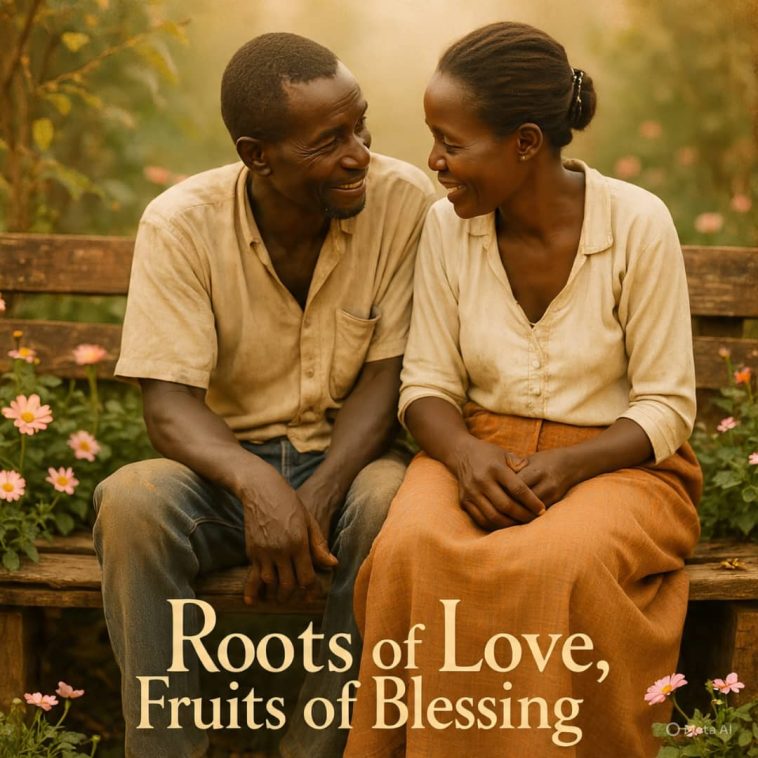PART I
The Forest of Mvepi
In the heart of Africa, where the earth was rich and dark and the trees rose like ancient guardians, there lay a small village called Mvepi. The people there lived close to the land. They tilled, planted, harvested, and lived by the rhythm of the seasons. To outsiders, life in Mvepi seemed hard, but to its people, it was the way of life—the way of their fathers and mothers before them.
Among the humble homes of grass and mud lived Elizabeth, a woman whose beauty was not just in her face but in her spirit. She was known for her kindness, for the way she carried water without complaint, and for how her laughter could brighten the weary.
Elizabeth had chosen to marry John, a man who owned almost nothing except his dignity, his strength, and his quiet wisdom. Many people whispered about him. He had no cattle, no great field of land, no riches to show. Some even laughed that Elizabeth had tied her future to a man of little promise.
But Elizabeth’s heart saw beyond what the eyes of others could see. She loved John with a devotion that could not be shaken.
When Elizabeth’s parents learned she wanted to marry John, they tried to stop her,
“My daughter,” her mother said, “marriage is not built only on love. How will you eat love? How will you clothe your children with love? Look around you—there are many men who can provide for you, men with land, with cows, with houses. Why choose John, a man who cannot even bring a goat to your bride price?”
Her father was sterner. “Elizabeth, you are shaming us. We raised you to choose wisely. Poverty is not something you should invite into your life. If you marry this man, you will regret it.”
But Elizabeth was unmoved. She bowed her head in respect and said softly, “Father, Mother, I hear your words, but my heart is fixed. I know John. I know his heart is good. I know one day God will bless us. I would rather suffer with a man I love than be comfortable with a man I cannot respect.”
Her parents shook their heads. Relatives mocked her. Friends whispered, “She is a fool.” But Elizabeth stood her ground.
And so, against all odds, Elizabeth and John married. Their home was small, just a hut in the clearing of Mvepi forest, but to them, it was filled with warmth and love.
Their days were hard. At dawn, John would take his hoe and go to the field, breaking the earth with sweat dripping from his brow. Elizabeth would fetch water from the stream, cook simple meals of cassava or maize, and help him in the field when her chores were done. They had little, but every evening, they sat side by side under the stars, talking, laughing, and praying for a better future.
Sometimes Elizabeth’s friends would pass by, dressed in fine clothes, carrying baskets of gifts from wealthier husbands. They would pity her.
“Elizabeth,” one friend said once, “you are too beautiful for this suffering. Leave this man before it is too late. You could have had a life in town, with lights, music, and ease. Why remain here with a poor man?”
Elizabeth smiled gently and replied, “My friend, when a tree is young, you do not cut it because it has no fruit. You wait. One day, it will bear fruit that will surprise everyone. I am waiting for my season.”
It was during those difficult years that God blessed them with twins—two healthy children, a boy and a girl. Their cries filled the little hut with joy.
The villagers were amazed. “Even in their poverty, God has given them double,” the elders said. “Perhaps there is a hidden blessing in this family after all.”
Raising twins was no easy task. Elizabeth would often go without food so her children could eat. John worked twice as hard, laboring on other people’s farms for a small wage just to buy clothes for the babies. Yet, even in hardship, their home was filled with love.
When the twins giggled, when they took their first steps, when they called out “Mama” and “Papa,” Elizabeth’s heart swelled. She saw them as a sign from heaven that her faith was not in vain.
Her relatives continued to mock her. “How will you raise two children when you cannot even feed yourselves? Leave this man, Elizabeth. He will drag you down.”
But she would hold her twins close and say, “If God has given us children in poverty, then surely He has a plan to raise them in abundance.”
What no one knew—what not even Elizabeth fully understood—was that John was not an ordinary poor man. While he appeared to live simply, John had been saving money for many years. Whenever he earned a little, he put some aside secretly. He did not spend foolishly. He observed the ways of people and understood that wealth, when revealed too soon, attracted not only friends but also envy and false loyalty.
John wanted to be sure of one thing: that Elizabeth’s love for him was true and not tied to riches. Every day he watched her endure hardship with patience. He saw her defend him against mockery, stand by him when her own family turned against her, and choose love over comfort. With each passing year, John’s heart overflowed with gratitude for the woman he had married.
And so he waited, quietly preparing, watching, and saving….
Part II is next…
This post was created with our nice and easy submission form. Create your post!








